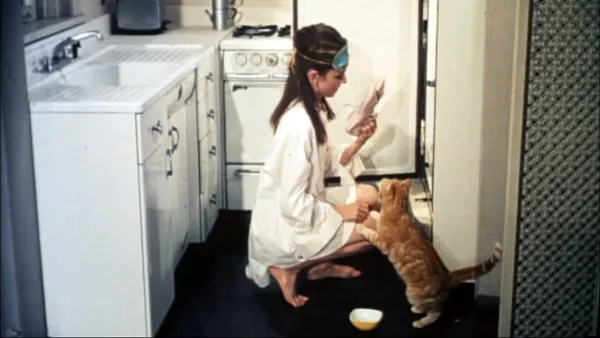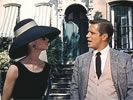Eye For Film >> Movies >> Breakfast At Tiffany's (1961) Film Review
Breakfast At Tiffany's
Reviewed by: James Benefield

With Breakfast At Tiffany’s, Audrey Hepburn doesn’t just star in the film, she is the film. Her portrayal of Holly Golightly, the flighty socialite who is the life and soul of Manhattan’s best parties, has been a benchmark performance for every romantic comedy since.
It’s an unlikely romantic comedy, however. In between visits to the high-end New York jewellery store Tiffany’s, she becomes besotted with her handsome new neighbour, Paul Varjak (George Peppard), a young, struggling writer. After being initially bemused, he soon warms to her but finds her a bundle of nerves, and, eventually, discovers (and not through Holly’s choice) her sad past. It’s unlikely plotting as it is increasingly jarring to see a portrayal of a female, and not a male, fear of commitment and stability. This is especially true in this cinematic world where the fashionable romantic comedy mainstream standard is either the post-slacker films of Judd Apatow or the toxically bland affairs of Jennifer Aniston’s latest vehicle.

It’s also an unusual case in which the bastardization of great source material actually pays dividends. Capote’s novella is a surprisingly dark masterpiece and was pretty progressive for its time; its strong implication that one of its central characters (Varjak) was gay (or, at least, bisexual), the promiscuity of its central female character and the ambivalent, if not melancholic, tone that concluded proceedings are all significantly played down or forgotten here.
Indeed, it’s a film that is in step with its contemporary Hollywood background, for better and for worse. Thankfully Holly is still a fairly strong, independent woman despite the playing down of her sexual liberation and the significant ‘Hollywoodisation’ of the movie’s ending. This is probably more to do with Hepburn’s performance, over the actual writing however. And, of course, Varjak succumbs to Holly’s charms (although this part of the story is strangely coy and chaste, perhaps a hangover from the source material). The main casualty of the film’s time period is the portrayal of Holly’s Asian landlord, Mr Yunioshi (Mickey Rooney). The racial politics on display are dubious, at best.
With a lot of the ambivalence, although not all of the melancholy, taken out, Blake Edwards and George Axelrod are free to inject the film with many an opportunity for heart-swooning movie moments. There’s Holly’s early morning gazing (complete with coffee and pastry) in the windows of Tiffany’s, her late night rendition of Moon River on her apartment balcony, the deliciously naughty shoplifting scene and, of course, the seminal finale in the rain.
Throughout, Hepburn dons a series of glamorous hats and dresses and parties a lot, all whilst wearing a brittle smile. Her mixture of strong and shaky is essential for the character, as she could otherwise be pretty unlovable. The actress’ charisma is also highly alluring, and it’s no surprise her image in the movie now appears on young girls’ handbags. It’s also this melancholy that offers a much-needed counterpoint to the otherwise perhaps quite overwhelming kookiness and cutesiness.
Like its central character, Breakfast At Tiffany’s is far from perfect. Parts of it have not dated well, it can be a little too saccharine and it lacks substance and clarity in some of its key relationships. However, it offers more than enough movie magic, and a magnificent central performance from Audrey Hepburn, to warrant repeated rewatching.
Reviewed on: 07 Nov 2009


















